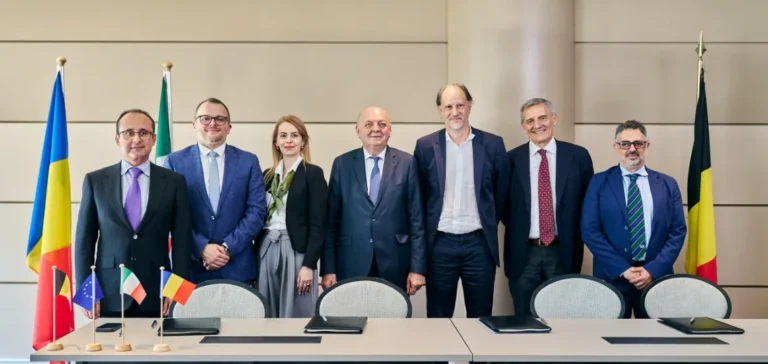Four European institutions in the nuclear sector have officially created the Eagles Consortium to develop and commercialise the EAGLES-300, a fourth-generation lead-cooled modular nuclear reactor. The partnership agreement was signed on the sidelines of the European Energy Council, gathering Belgian, Italian, and Romanian government officials.
A strategic European partnership
The project involves Belgium’s Nuclear Energy Research Centre (SCK-CEN), Italy’s National Agency for New Technologies, Energy and Sustainable Economic Development (ENEA), Italian firm Ansaldo Nucleare, and Romania’s nuclear research organisation RATEN. The agreement was finalised in the presence of several high-level political representatives, including Mathieu Bihet, Belgian Minister of Energy, and Gilberto Pichetto Fratin, Italian Minister of Environment and Energy Security.
The EAGLES-300 reactor falls within the European Industrial Alliance initiative on Small Modular Reactors (SMR), launched by the European Commission. Selected the previous year under the designation EU-SMR-LFR, it is one of two projects chosen by the Alliance for accelerated development by 2030.
A reactor with advanced features
With an estimated power output of approximately 350 megawatts electric (MWe), this reactor will offer features adapted to the current needs of electricity grids, with increased flexibility for industrial heat supply and hydrogen production. Its modular design aims to lower initial investment costs, shorten construction periods, and facilitate more flexible deployment.
The EAGLES-300 will utilise Mixed Oxide Fuel (MOX), incorporating recycled materials. This approach should enhance fuel management efficiency, notably reducing radioactive waste generation.
Two test sites in Belgium and Romania
The consortium plans two distinct facilities for technical testing: the LEANDREA site in Mol, Belgium, primarily dedicated to fuel and material evaluations, with an operational target set for 2035. Meanwhile, the ALFRED (Advanced Lead Fast Reactor European Demonstrator) facility in Pitești, Romania, will be upgraded to prepare for future global commercial operations planned for 2039.
ENEA Director General Giorgio Graditi stated: “The consortium will greatly benefit from its members’ complementary expertise in lead cooling technology.” According to Graditi, this synergy will reinforce the consortium’s European position as a benchmark for lead-cooled reactor technology.
Cristian Bușoi, Romanian Secretary of State for Energy, highlighted the integration of this project within Europe’s energy strategy, supported by European initiatives such as the Sustainable Nuclear Energy Technology Platform (SNETP) and the European Sustainable Nuclear Industrial Initiative (ESNII), focused on developing fourth-generation nuclear reactors.






















